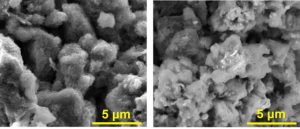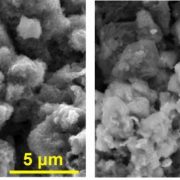The batteries made from asphalt that could charge your phone in just 5 minutes

Source:Tour Group/Rice University
- They charge 10 to 20 times faster than commercial lithium-ion batteries
- Researchers developed anodes with porous carbon made from asphalt
- This means it could be charged much faster than normal lithium-ion batteries
- They were exceptionally stable after more than 500 charge-discharge cycles
Lithium batteries with a touch of asphalt could charge ten to 20 times faster than commercial lithium-ion batteries, according to new research.
Instead of taking hours to charge, these super batteries can go from zero to being full in just five minutes.
Researchers developed anodes with porous carbon made from asphalt that were exceptionally stable after more than 500 charge-discharge cycles.
Lithium-ion batteries are probably as effective as they are ever going to be so researchers are increasingly looking into possible replacements.
To make their new battery, scientists from from Rice University added a derivative of asphalt called gilsonite as a new ingredient.
They then coated it in lithium metal and added a cathode made of sulfurized carbon.
Scientists found this asphalt and lithium anode had a high-current density of 20 milliamps per square centimetre.
This means it could be charged much faster than normal lithium-ion batteries.
It also had a high-power density of 1,322 watts per kilogram and high-energy density of 943 watt-hours per kilogram.
‘The capacity of these batteries is enormous, but what is equally remarkable is that we can bring them from zero charge to full charge in five minutes, rather than the typical two hours or more needed with other batteries,’ Rice lab of chemist James Tour said.
Tests revealed they also stopped the formation of lithium dendrites. These are the mossy deposits that invade a battery’s electrolyte.
If they extend far enough, they short-circuit the anode and cathode and can cause the battery to fail, catch fire or explode.
But the asphalt-derived carbon prevents any dendrite formation.
An earlier project by the lab found that an anode of graphene and carbon nanotubes also prevented the formation of dendrites.
Dr Tour said the new composite is simpler.
‘While the capacity between the former and this new battery is similar, approaching the theoretical limit of lithium metal, the new asphalt-derived carbon can take up more lithium metal per unit area, and it is much simpler and cheaper to make,’ he said.
‘There is no chemical vapor deposition step, no e-beam deposition step and no need to grow nanotubes from graphene, so manufacturing is greatly simplified.’
Researchers did not say if or when these batteries could be available.
Source:The batteries made from asphalt that could charge your phone in just 5 minutes




